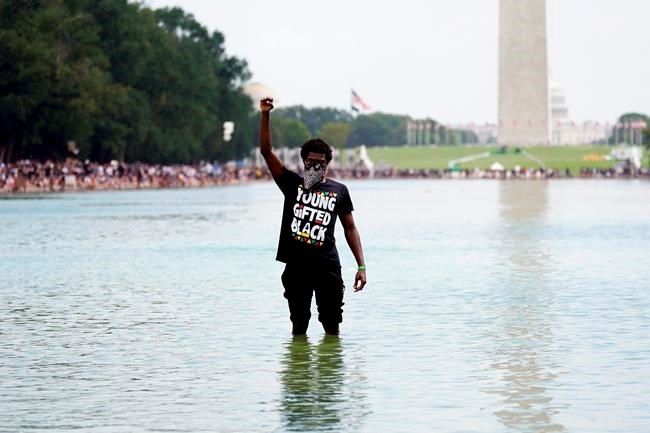WASHINGTON — Thousands of people gathered Friday at the feet of Abraham Lincoln, conjuring iconic images from the turbulent heights of America's civil rights movement, to pay tribute to the growing roster of Black victims of police violence and protest decades of systemic, race-based oppression.
Marking the anniversary of Martin Luther King Jr.'s historic "I Have a Dream" speech in 1963, Rev. Al Sharpton's protest — dubbed the "Get Your Knee Off Our Necks" Commitment March — was originally planned in the weeks following the killing of George Floyd, who died in May after nearly nine minutes in the custody of a kneeling Minneapolis police officer.
But Sunday's shooting of 29-year-old Jacob Blake, in hospital and paralyzed from the waist down after taking seven police bullets in the back, instilled a fresh sense of urgency for a reckoning that has filled American streets with anger, punctuated by periodic outbursts of violence and lawlessness, for the last three months.
"Because they came in '63, we were able to come back in 2020," Sharpton bellowed. "They opened the door for us, but there's still some doors we have to open and some people we've got to straighten out."
Friday's crowd was sparse compared to the estimated 250,000 who showed up to hear King 57 years ago, a symptom of the ongoing COVID-19 pandemic. Organizers had expected 50,000 people to attend and refused admittance to anyone without a mask.
But to Blake's father, the cause was no less important.
Resting in the shade to escape the late-summer 34 C heat, Jacob Blake Sr. evoked the memory of his own dad, an active participant in the civil rights efforts of the 1960s, including the fateful clash between police and a group of activists trying to cross the Alabama River en route to the state capital of Montgomery in 1965.
"When my father walked across the Edmund Pettus Bridge, he didn't show no fear. He knew they were gonna whup him, and he took that risk," Blake Sr. said.
"Sometimes you've got to take the risk to move forward."
Martin Luther King III, his namesake's oldest living son, urged protesters to keep up their efforts.
"We've come to bear witness, to remain awake, to remember from where we've come and to carefully consider where we're going," he said. "We're taking a step forward on America's rocky but righteous journey toward justice."
Police in Kenosha, Wis., were responding to a domestic dispute Sunday when they encountered Blake and tried to arrest him. Cellphone video shows officers following Blake with their guns drawn as he walks away from them. One, clutching the edge of Blake's shirt, shoots him seven times in the back as he leans into the front door of his SUV, in which three of his children were seated.
The officer who shot Blake has been identified as Rusten Sheskey, a seven-year veteran of the local force. Sheskey shot Blake after he and another officer each tried to subdue him with a stun gun, according to a news release from the department. State agents later recovered a knife from the floor on the driver's side of the vehicle, the department said.
Sheskey couldn't have known about the knife, Sharpton noted.
"When he shot him, he didn't know what was in the car," he said. "What he knew was that a Black man seems to be expendable. And we come to say we are no longer expendable; we are going to demand justice."
Friday's march capped two weeks of political finger-pointing as both the Democrats and Republicans held their national conventions in advance of the Nov. 3 presidential election. The months of social unrest proved a popular talking point with dramatically different perspectives, depending on which party was speaking.
Democrats reached out to Black Americans in sympathy to their cause, while Republicans promised to restore "law and order" on American streets, barely mentioning the reasons why protesters have been there in the first place.
In June, the Democrat-controlled House of Representatives passed the George Floyd Justice In Policing Act, which would ban police chokeholds and end qualified immunity for officers, among other reforms. In July, Democratic senators reintroduced legislation to restore a provision of the 1965 Voting Rights Act that would require states to seek federal clearance before changing voting regulations.
Both measures are currently in the hands of the Republican-controlled Senate.
"Systemic racism is real; I don't care what they tell you. It's real," said Blake Sr., who recited all the ways in which Black parents in the U.S. have to school their children about what to do when interacting with police.
"Even if you have all the information that they want, you have to act a certain way, or they will kill you. They become the judge, the jury and the executioner, all in one."
Also Friday, a judge in Illinois agreed to delay until Sept. 25 an extradition hearing for Kyle Rittenhouse, a 17-year-old charged in the shooting deaths of two people at the height of the protests in Kenosha.
Rittenhouse was one of several armed civilians who were patrolling the streets in what he is heard on cellphone video describing as an effort to protect businesses from vandalism. He is accused of killing two men who tried to disarm him and wounding a third, actions that his lawyers argue were taken in self-defence.
This report by The Canadian Press was first published Aug. 28, 2020.
— With files from The Associated Press; follow James McCarten on Twitter @CdnPressStyle
James McCarten, The Canadian Press



